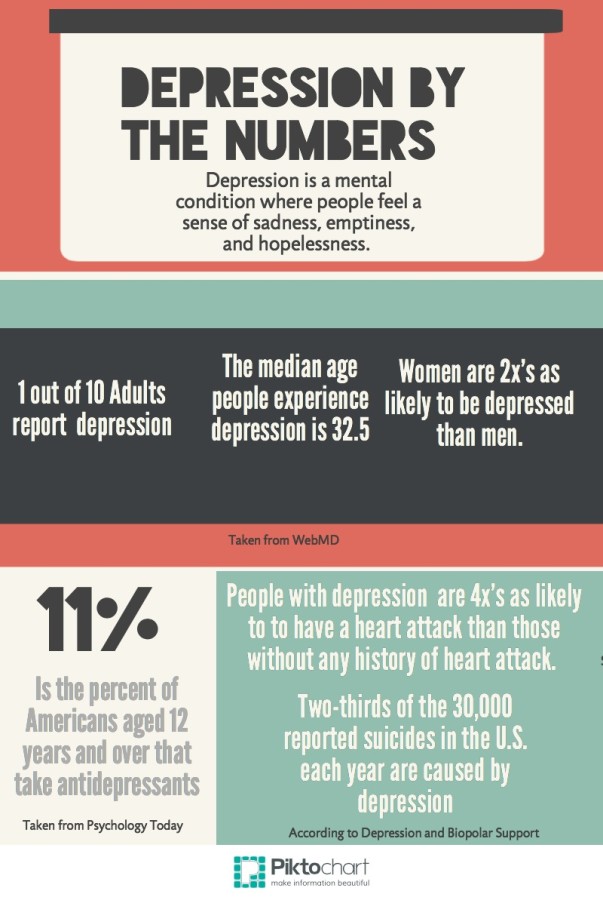Depression is one of many mental illnesses that affect people all around the world.
Antonio Garcia, Business Management major, shared his thoughts on what depression means to him.
“Depression is someone who doesn’t have a person to talk to, to give their thoughts too, someone that kind of feels lonely and doesn’t have hope in anything,” said Garcia.
Destiny Mendoza, Nursing major, thinks that depression is linked to an event that someone experiences that makes them really sad.
Mendoza also thought, like Garcia, that one way she would help a friend who goes through depression is by having a conversation with them.
Therapist Stacey Schiffman, “Depression is feeling a sense of hopelessness and worthlessness, lack of motivation, lack of pleasure; it also is related to sleeping to little or too much, as well as problems with eating.”
Depression affects a lot of people in America every year.
According to The Gale Encyclopedia of Genetic Disorders, their is approximately 9.5% of the American population, or 19 million people, who are affected by depression in any given year.
There are numerous factors that can lead into depression.
According to Encyclopedia of Sociology, some of the main risk factors for long-term depression include heredity, age, gender, and lack of social support.
They also found that women are twice as likely to become depressed than men.
Schiffman said that she knew people who lived happy lives but they still have those feelings of depression.
She finds that a majority of the people that come to her with depression usually stem from a divorce, death in the family, or a car accident.
Symptoms of depression can vary with every person depending on many things.
Genetics & Inherited Conditions found that symptoms of depression change over time and may include persistent feelings of sadness, anxiety, or emptiness; hopelessness; feelings of guilt, worthlessness, or helplessness; loss of interest in hobbies and activities; loss of interest in sex; tiredness; trouble concentrating, remembering, or making decisions; and trouble sleeping, waking up too early, or oversleeping.
Of the treatments that are available for depression are antidepressants and psychotherapy, a treatment which offers people the opportunity to identify the factors that contribute to their depression do to deal effectively with the psychological, behavioral, interpersonal and situational causes.
Cognitive/behavioral therapies focus on how the affected individual may be able to change his or her patterns of thinking or behaving that may lead to episodes of depression.
“CBT(Cognitive/behavioral therapies) is kind of like a thought journal and on the left column you would say I have no friends or what ever they are going through and the right column would be what’s your positive-rational thought,” said Schiffman.
Schiffman shared that one she gets them thinking differently by asking her patients about the good things that happened to them instead of the bad things. She said that the people who focus on the negative feelings distort their reality.
Even with all the treatments that go with depression, some of the treatments may not lead to the desired outcome that one wishes.
According to Science Daily, Children and young adults who start antidepressant therapy at high doses, rather than the prescribed doses, appear to be at greater risk for suicidal behavior during the first 90 days of treatment.
Alternative treatments that have been used for depression include placebos, a pill that causes the placebo effect that tricks the patient into getting treated.
Nordic Psychology found that outpatients in the period 1981-2000 found an increase in response rates among placebo groups corresponding to outpatient use in a decade.
Garcia mentioned that one of the ways he would treat someone who is closed to him that have depression with just talking about what they are feeling.
Genetics and Inherited Conditions found that other symptoms may include eating more or less than usual; weight gain or weight loss; thoughts of death or suicide, with or without suicide attempts; restlessness or irritability; and physical symptoms that defy standard diagnosis and do not respond well to medical treatments.
Psychology Today found that exercising for 30 minutes a day can help alleviate the symptoms of depression
The Student Health Service’s at Cerritos College provide six to eight session’s to students who are enrolled in the current semester.










